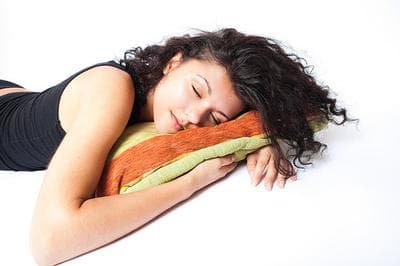Advertisement
Why To Exercise Today: So You Can Sleep Tonight
It's something that everyone who has suffered from insomnia or been summoned hourly by the hungry cries of a newborn baby knows: sleep is critical for sanity, physical health and proper brain functioning. Without it, you're sunk.

According to the poll of 1,000 adults between 23 and 60 years old:
Self-described exercisers report better sleep than self-described non-exercisers even though they say they sleep the same amount each night (6 hours and 51 minutes, average on weeknights). Vigorous, moderate and light exercisers are significantly more likely to say “I had a good night’s sleep” every night or almost every night on work nights than non-exercisers (67%-56% vs. 39%). Also, more than three-fourths of exercisers (76%-83%) say their sleep quality was very good or fairly good in the past two weeks, compared to slightly more than one-half of non-exercisers (56%).
Of course, self-reporting is always tricky, and it is possible that the good sleepers just felt more compelled to exercise, rather than the other way around, but still, the link between exercise and better quality sleep just makes intuitive sense (for what that's worth).
Among poll respondents, more intense exercise tended to be better and those who didn't exercise at all seemed to suffer most from sleep problems.
From the Sleep Foundation news release:
Vigorous exercisers are almost twice as likely as non-exercisers to report “I had a good night’s sleep” every night or almost every night during the week. They also are the least likely to report sleep problems. More than two-thirds of vigorous exercisers say they rarely or never (in the past 2 weeks) had symptoms commonly associated with insomnia, including waking up too early and not being able to get back to sleep (72%) and difficulty falling asleep (69%). In contrast, one-half (50%) of non-exercisers say they woke up during the night and nearly one-fourth (24%) had difficulty falling asleep every night or almost every night...
Non-exercisers tend toward being more excessively sleepy than exercisers. Nearly one-fourth of non-exercisers (24%) qualify as “sleepy” using a standard excessive sleepiness clinical screening measure. This sleepiness level occurs about twice as often than for exercisers (12-15%). Also, about six in ten of non-exercisers (61%) say they rarely or never have a good night’s sleep on work nights.
Sleepiness clearly interferes with many non-exercisers’ safety and quality of life. One in seven non-exercisers (14%) report having trouble staying awake while driving, eating or engaging in social activity at least once a week in the past two weeks, almost three times the rate of those who exercise (4-6%)...
Indeed, non-exercisers have more symptoms of sleep apnea. Sleep apnea is a serious medical condition in which a person stops breathing during sleep. Its symptoms often include tiredness, snoring, and high blood pressure. It also increases the risk for heart disease and stroke. More than four in ten non-exercisers (44%) exhibit a moderate risk of sleep apnea, compared to between one in four and one in five of light exercisers (26%), moderate exercisers (22%) and vigorous exercisers (19%).
So, here are some of the Foundation's sleep tips:
--Exercise regularly. Vigorous exercise is best, but even light exercise is better than no activity. Exercise at any time of day, but not at the expense of your sleep.
--Create an environment that is conducive to sleep that is quiet, dark and cool with a comfortable mattress and pillows.
--Practice a relaxing bedtime ritual, like a warm bath or listening to calming music.
--Go to sleep and wake at the same time every day, and avoid spending more time in bed than needed.
--Use bright light to help manage your "body clock." Avoid bright light in the evening and expose yourself to sunlight in the morning.
--Use your bedroom only for sleep to strengthen the association between your bed and sleep.[My aside: really, only for sleep? Nothing else?] It may help to remove work materials, computers and televisions from your bedroom.
--Save your worries for the daytime. If concerns come to mind, write them in a "worry book" so you can address those issues the next day.
--If you can't sleep, go into another room and do something relaxing until you feel tired.
--If you are experiencing excessive daytime sleepiness, snoring, or “stop breathing” episodes in your sleep, contact your health care professional for a sleep apnea screening.
This program aired on March 5, 2013. The audio for this program is not available.
